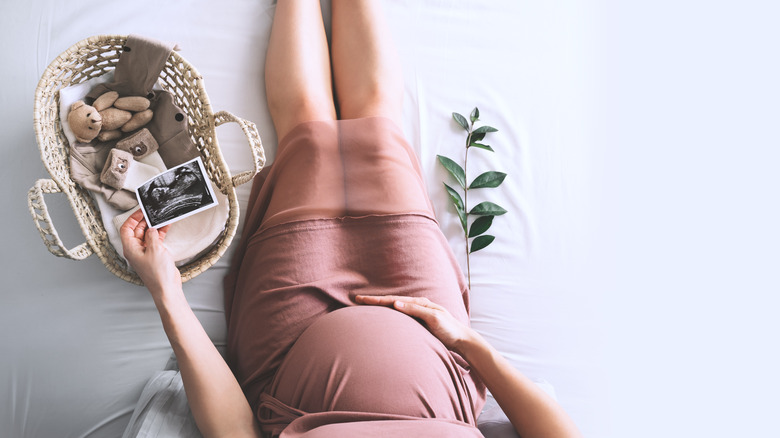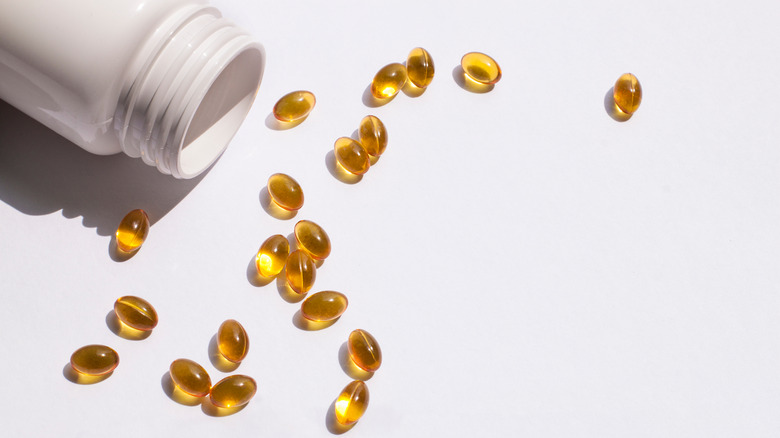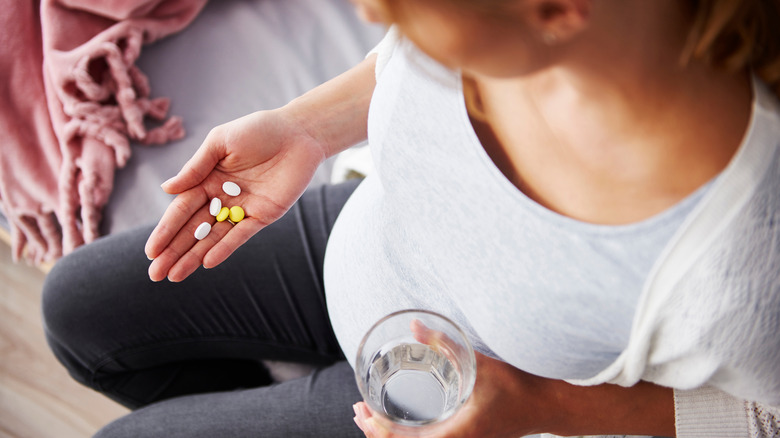What Happens If You Don't Take Prenatal Vitamins While Pregnant?
As a pregnant woman, it's essential to take proper care of yourself and keep a close eye on your own health, so you can ensure an in-utero environment that is safe for the development of your unborn baby. While it can be overwhelming to figure out what's best for you and your baby if you've never been pregnant before, there are steps that one can take to promote a healthy and safe birth once your little one is ready to enter the world.
According to UC San Diego Health, regular exercise is something that can help facilitate a healthy pregnancy. Moderate exercise like walking, riding a stationary bike, and yoga can be beneficial for you and your baby, as explained by March of Dimes. Both mother and baby benefit from physical activity during pregnancy, as it may lead to a reduction in pregnancy complications and a decreased chance of having a cesarean birth. In any case, it's wise to consult your doctor about how much, and what types of exercise, are safest for you and your baby.
During pregnancy, what you put into your body is just as important as how often you move your body. Pregnancy may be the perfect time to start eating healthy by making sure you consume enough vegetables, fruits, proteins, and dairy products (per the Office of Disease Prevention and Health Promotion). In addition, many women know about the importance of taking prenatal vitamins while pregnant, but what are they, and what makes them so effective?
What are prenatal vitamins and what do they do?
When you first find out you're pregnant, your OB/GYN will recommend that you start taking prenatal vitamins. Women who aren't yet pregnant but are actively trying to conceive are also encouraged to take prenatal vitamins, according to Healthline. This is so your body can prepare for carrying a baby with the nutrients it obtains from prenatal vitamins. We know that prenatal vitamins are important for reproductive health, but which ones should a pregnant woman take?
Folic acid is one of the most vital nutrients for a woman to take during pregnancy, explains Planned Parenthood. This is because folic acid supports the growth and development of a fetus during pregnancy. Along with being available in capsule form, folic acid can be found in foods like nuts, beans, and leafy green vegetables, reports WebMD.
Besides folic acid, other nutrients that are essential during pregnancy include iron, calcium, vitamin D, and iodine (per March of Dimes). When a woman is pregnant, she requires twice as much iron, and she should have 27 milligrams of iron every day. As a fetus grows, calcium plays an important role in the development of his or her bones, heart, teeth, muscles, and nerves, and an anticipating mother should get 1,000 milligrams each day.
Additionally, vitamin D contributes to the growth of a baby's bones and teeth, as well as preventing infection in the body. Lastly, iodine helps to keep a mother's thyroid function healthy, shares WebMD.
What could happen if a pregnant woman doesn't take prenatal vitamins?
Because prenatal vitamins have so many benefits, not taking them could lead to a number of adverse effects. According to TopLine MD, a deficiency of folic acid is associated with the neural tube defects anencephaly and spina bifida. Anencephaly is when the skull and brain of a baby don't develop normally. Babies who are affected don't survive. Infants born with spina bifida can survive, but they may experience physical disabilities due to improper spine development.
A deficiency of other nutrients can also contribute to health problems during pregnancy. As explained by WebMD, not receiving enough iodine during a pregnancy may result in miscarriage, stillbirth, deafness in the baby, or mental disabilities.
In addition, a 2017 article published in The Journal of Obstetrics and Gynecology of India discusses the association between a lack of calcium during pregnancy and a pregnancy complication called preeclampsia. Untreated preeclampsia can be potentially fatal for a mother and her baby, and a mother may experience high blood pressure, kidney damage, or damage to other organs (per Mayo Clinic).
Insufficient levels of iron during a pregnancy can lead to anemia, which negatively affects the growth of a developing fetus, as reported by the Cleveland Clinic. Symptoms of iron deficiency during pregnancy include fatigue and dizziness, pale and dry skin, a faster heartbeat, and restless legs syndrome.
With all of this in mind, Mayo Clinic suggests looking for prenatal vitamins that offer folic acid, iron, calcium, vitamin D, and iodine.



